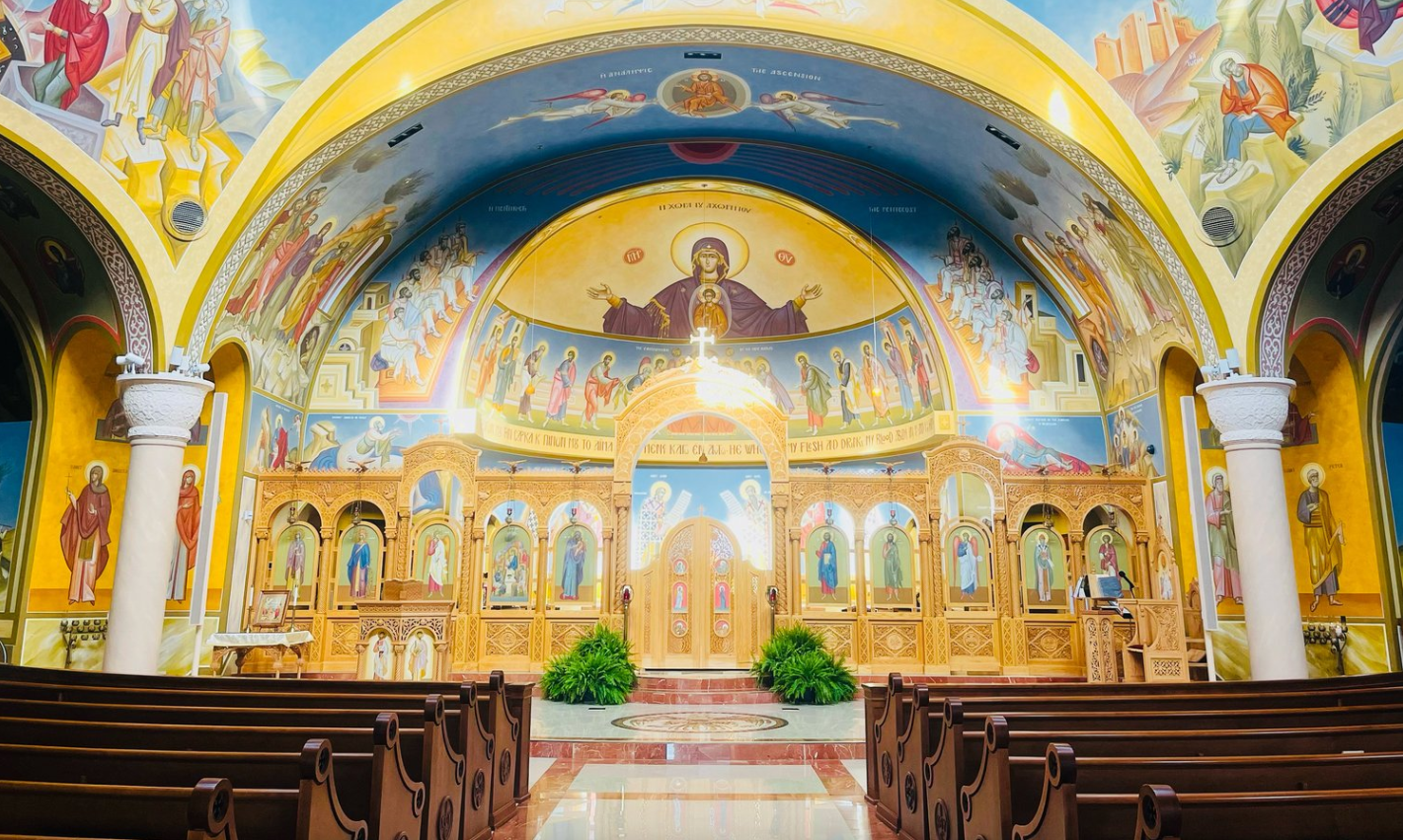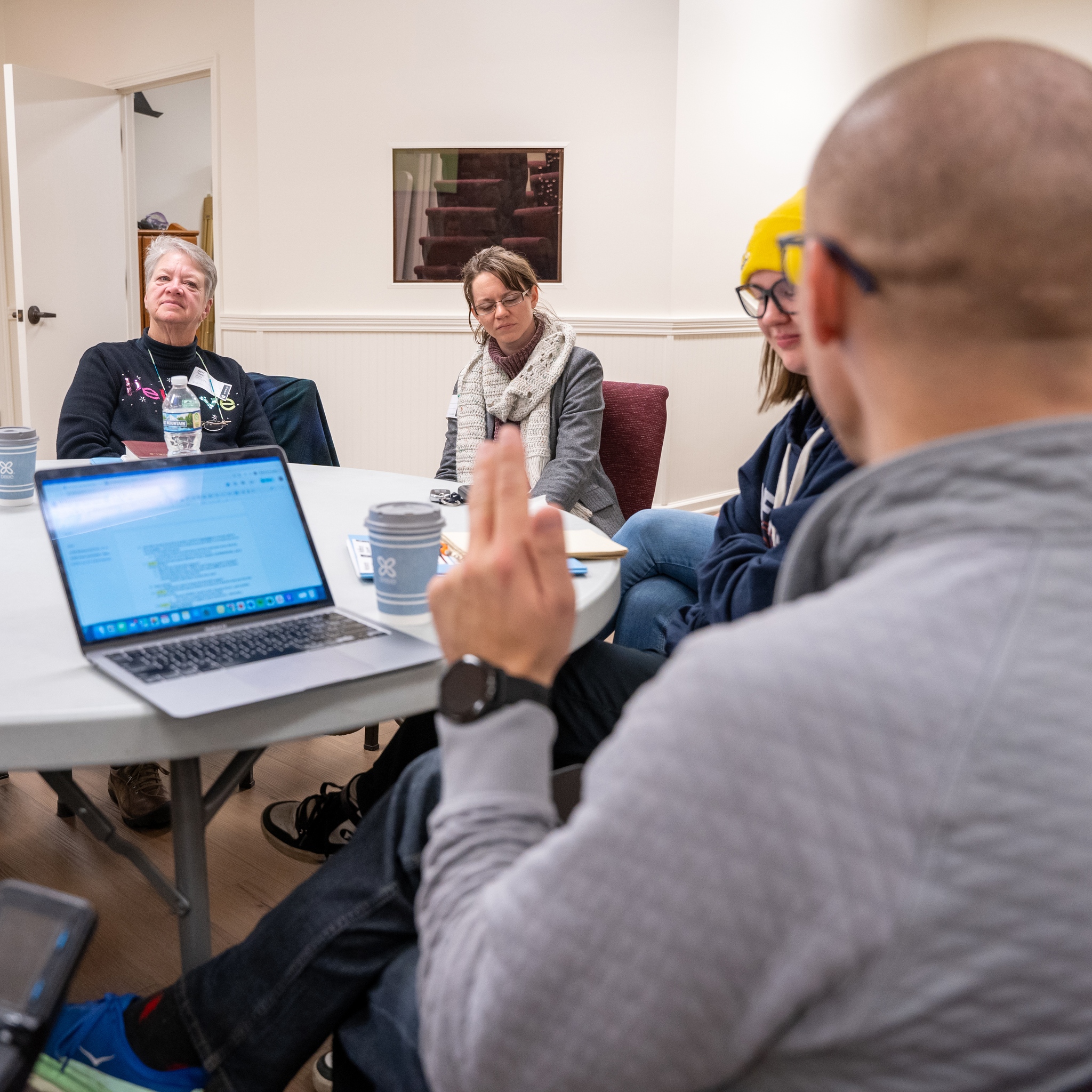
- How we helpServicesThe Congregational Resource Guide
The CRG (Congregational Resource Guide) is an online tool designed to help leaders of all congregations find the right resources to address their unique challenges and needs.
Visit The CRG- Resources & Events
 Live OnlineRecorded Event
Live OnlineRecorded Event- Stories
Share your storyLifting up stories from across the state is critical to building connections, forging a stronger congregational community, and helping others grow. Has Center for Congregations helped you navigate a challenge or opportunity? Please share your story with us.
Share a story idea- About
Our MissionThe Center for Congregations strengthens Indiana congregations by helping them find and use the best resources to address their challenges and opportunities.
About UsThe Center for Congregations strengthens Indiana congregations by helping them find and use the best resources to address their challenges and opportunities.Contact UsCenter for Congregations
303 North Alabama Street, Suite 100
Indianapolis, IN 46204Creating a Home for the Special Needs Community
In 2019, with a vision in mind, Mount Pleasant United Methodist Church in Terre Haute, Indiana, began their Community Ministry Grant project with the Center for Congregations. What transpired turned out to be even greater than they had anticipated. Read to learn more about Mount Pleasant UMC and their one-of-a-kind Friendship House.
Mount Pleasant United Methodist Church (UMC) is a congregation of 400 people with a passion for the special needs community. As the only church in their town of Terre Haute, Indiana, with a ministry specifically dedicated to those with special needs, Mount Pleasant UMC felt a calling to expand their ministry out into the greater community.
“As a ministry, we would often sit in a circle with our friends with disabilities and hear them pray about all sorts of dreams they had,” says Jess Berryhill, Youth Ministry Pastor at Mount Pleasant UMC. “Within each story, one thing in particular stood out. Our friends really desired a sense of purpose in their lives.”
Through these deep interpersonal conversations, Jess and her team realized that it was community that was the missing piece. They began asking themselves; ‘What would it look like if we created a place that was a hub for that community?” Enter the Center for Congregations. In 2019, Mount Pleasant UMC launched their Community Ministry Grant with the Center, a program dedicated to funding and planning a community needs-based project. With their grant, Mount Pleasant UMC set out to accomplish something never done by another church before- establish a Friendship House, a place for young adults with special needs to live in community with one another.
“Our pastor said it was a really big dream,” says Jess. “And it was, but ultimately he and everyone else agreed it was something that we needed to do.”
After receiving approval from the church’s leadership board in March of 2020, Jess and her team set out to find a space for the Friendship House. The following month they found a duplex in a nearby neighborhood that was a perfect fit.
“The duplex we found had just been completely renovated after a house fire,” says Jess. “The best part is that both sides of the duplex were available. By the time July rolled around, we had rented both sides, and in August, we started moving people in.”
The Friendship House’s initial group of eight residents consisted of several individuals with disabilities who attended Mount Pleasant UMC’s special needs ministry and a handful of undergraduate students who served in the church. Jess moved into the Friendship House with the residents to serve as their adult coordinator and supervisor.
“The Friendship House is home to both undergraduate students and people with disabilities as a way to foster community and create a learning environment for everyone,” says Jess. “Our undergraduate students felt living in the Friendship House was a natural way to continue to serve the Lord outside of the church setting.”

During its first year of existence, the Friendship House quickly became a hotspot for community gathering. Residents invited guests into their home as they hosted game nights, group dinners, and youth group bible study sessions.
“Our model is essentially that we eat together, pray together, and celebrate together,” says Jess. “We have a 12-foot-long dining room table that was custom built for the home. It’s tradition that whenever someone new comes over for dinner, we turn over a chair and have them sign it as a way to remind them that they always have a place at our table.”
The Friendship House experienced the unique issue of establishing itself in the midst of the COVID-19 pandemic. However, residents took advantage of their time in quarantine together to build connections within their neighborhood. They spent their time baking homemade goods, completing service projects, and hosting weekly community dinners for the neighborhood. This allowed community members to learn about the Friendship House and connect with its residents in a meaningful way.
“One of the things we wanted to do with the Friendship House was not just create community within our four walls, but also within the streets of our neighborhood,” says Jess. “A lot of great connections were built during the pandemic that are repaying dividends as we continue to live in the community.”
The Friendship House has already proven to be a valuable asset to its residents as they have learned new skills related to caring for a home, living with others, and supporting their community. Undergraduate residents of the Friendship House have gone on to become advocates for the special needs community within their respective arenas. Thanks to the Friendship House, residents have also become further integrated within the church community at large. Special needs residents have become more involved within the church setting- attending services, serving in different ministries, and reading literature during Christmas.
“The Friendship House has become a fruitful place for merging connections,” says Jess. “Its multifaceted nature has allowed both our undergraduate and special needs residents alike to adopt a new-found sense of independence.”
Not only has Jess witnessed the growth of her residents, but she has also watched the Friendship House project open doors to important conversations within the church. For instance, creating accessibility for their disabled patrons has become top of mind at Mount Pleasant UMC. Within the past year, the church has installed button doors, improved wheel chair ramps, and created space for wheelchair seating within the middle rows of their pews.
“The realization that special needs ministry is becoming a part of who we are as a church is really exciting,” says Jess. “We’ve seen the receptiveness of our special needs community increase and it’s changing the face of our church.”
The Community Ministry Grant has been life changing for Jess within ministry. She describes the Center for Congregations as helpful, supportive, and tangible.
“As a church, sometimes you just don’t have the plan or resources you need for a project,” says Jess. “The Center for Congregations gives churches those tools and serves as a guide throughout the process.”
Today, Mount Pleasant UMC’s Friendship House is connected to a larger network of friendship houses across the nation. As these friendship houses are run by colleges, universities, and seminaries, Mount Pleasant UMC remains to be the only church-run friendship house. However, it’s looking like that is about to change within the next few years.
“We didn’t know it at the start, but our Friendship House was going to be a steppingstone to something much bigger,” says Jess. “Other churches have heard our story and have shared with us that they, too, are inspired to start their own friendship houses.”
In regard to future plans, Mount Pleasant UMC is looking to expand their Friendship House. With several empty lots in the neighborhood, it’s likely that the Friendship House will eventually increase in size, allowing for more people to join their family. Jess hopes that as the Friendship House continues to embrace the special needs community, the town of Terre Haute does, too.
“Our goal is to not only be a special needs ministry, but to ultimately become a special needs church,” says Jess. “And our dream is for that to leak into the town, too. It would be amazing if Terre Haute became known as a town that really embraced people with disabilities.”
Related Stories
Holy Trinity Greek Orthodox Church
The Center for Congregations is funded by Lilly Endowment, Inc. and is a supporting organization of the Christian Theological Seminary in Indianapolis and Louisville Presbyterian Theological Seminary.
The Latest on the PodcastS6 E13: Make Social Media Social!Podcast Guests: Tim Campbell-Smith & Kaeli Sweigard - Resources & Events
